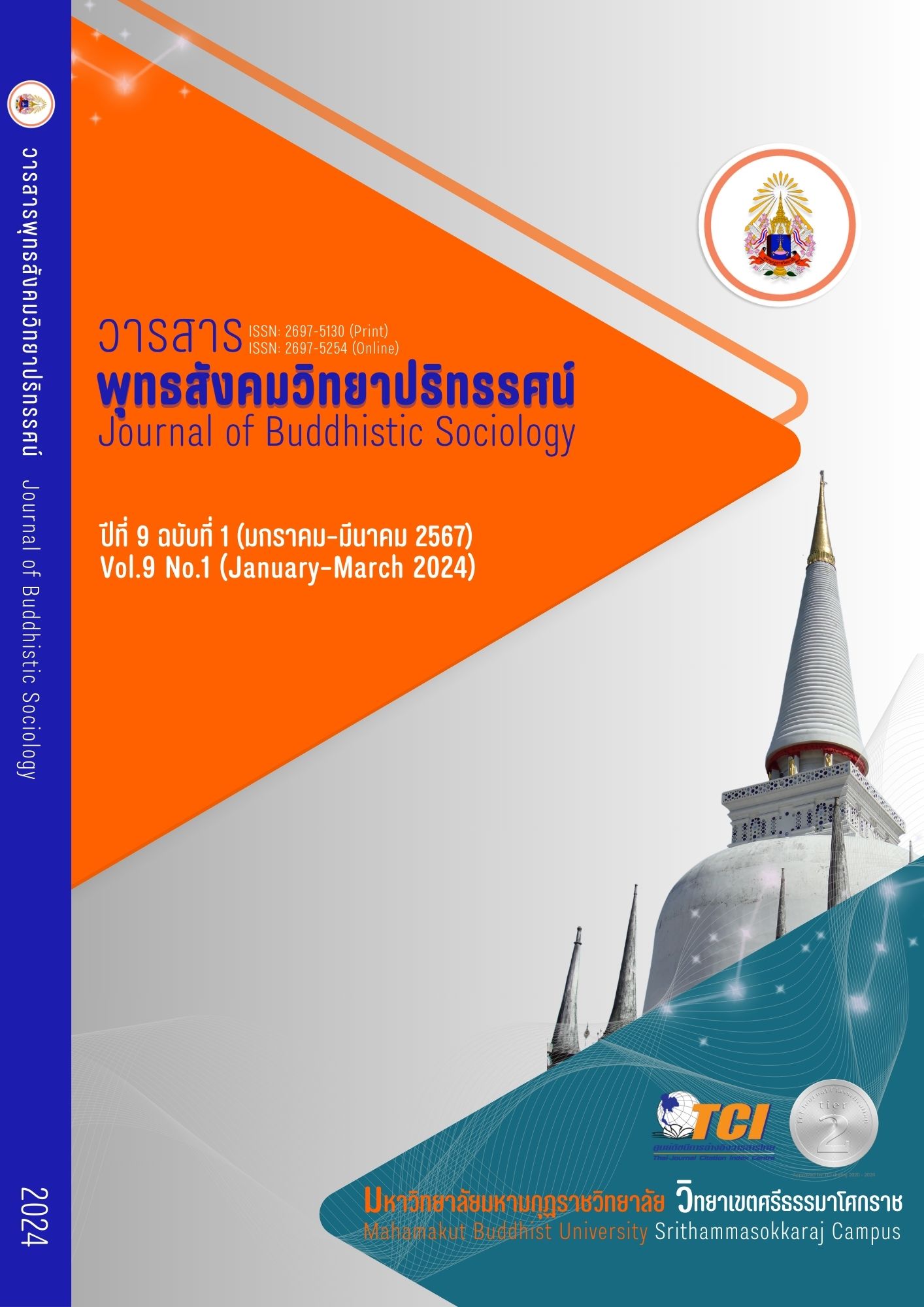AN APPLICATION OF BRAHMAVIHARA DHAMMA PRINCIPLE IN DUTY PERFORMANCE OF PERSONNEL IN SONGKHLA JAIL
Main Article Content
Abstract
The purposes of this research were to study 1) an application of Brahmavihara Dhamma principles in the duty performance of personnel in Songkhla Prison and 2) suggestions concerning the application of Brahmavihara Dhamma principles in duty performance of personnel in Songkhla Prison. It was a combined research method between quantitative and qualitative research. The population and quantitative sample included 79 prison officers performing duties under the Songkhla Provincial Prison. The qualitative part consisted of four prison administrators performing duties under the Songkhla Provincial Prison, selected using a purposive method. The tools used to collect data were questionnaires and interviews, and the statistics used to analyze quantitative data were frequency distribution, percentage, mean, standard deviation, and descriptive analysis of qualitative data.
The study results revealed that:
- Overall, the application of Brahmavihara Dhamma principles in the duty performance of personnel in Songkhla Prison was at the highest level (µ=4.71, δ=0.53).
- Suggestions for the application of Brahmavihara Dhamma principles in the duty performance of personnel in Songkhla Prison were as follows: 1) Metta -organizing activities to enhance relationships within the organization such as arranging recreational sports events, morning coffee parties, and addressing good wishes to colleagues once a week. 2) Kuruna-organizing activities or training regarding Dhamma to promote and inform knowledge on human rights, having fund arrangements to help personnel, and always allowing subordinators to have vacation leaves. 3) Mutita-the organizations should promote their personnel by arranging training to create a good understanding concerning using the Mutita principle at work. Finally, 4) Ubekkha-it is advisable that Dhamma training should be arranged for the personnel. It should also operate each person’s duty check to see the load of responsibility each has to consider further responsibility assignments.
Article Details

This work is licensed under a Creative Commons Attribution-NonCommercial-NoDerivatives 4.0 International License.
References
กรมราชทัณฑ์. (2564). ภารกิจและอำนาจหน้าที่ของกรมราชทัณฑ์. เรียกใช้เมื่อ 25 สิงหาคม 2564 จาก http://www.correct.go.th
เนติยา ผลหิรัญ. (2559). การใช้หลักพรหมวิหารธรรมของบิดามารดาในการเลี้ยงดูบุตรวัยรุ่นโรงเรียนนาบอน อำเภอนาบอน จังหวัดนครศรีธรรมราช. ใน สารนิพนธ์ศาสนศาสตรมหาบัณฑิต สาขาวิชาสังคมวิทยา. มหาวิทยาลัยมหามกุฏราชวิทยาลัย.
พระมหาณัฐวุฒิ ฐานวุฑฺโฒ (เอียดเรือง). (2562). การใช้หลักพรหมวิหารธรรมในการบริหารกิจการคณะสงฆ์ของพระสังฆาธิการธรรมยุต จังหวัดนครศรีธรรมราช. วารสารปัญญา, 26(2), 63-72.
วิลาสินี ประกัน. (2562). การบริหารกองทุนหมู่บ้านของคณะกรรมการตามหลักพรหมวิหารธรรม อำเภอแก่งคอย จังหวัดสระบุรี. ใน การประชุมวิชาการระดับชาติ ครั้งที่ 18 และระดับนานาชาติ ครั้งที่ 2. มหาวิทยาลัยมหามกุฏราชวิทยาลัย.
ส่งศรี ชมภูวงศ์. (2554). ระเบียบวิธีวิจัยทางสังคมศาสตร์. นครศรีธรรมราช: มหาวิทยาลัยมหามกุฏราชวิทยาลัย วิทยาเขตศรีธรรมาโศกราช.
Maslow, Abraham M. (1954). Motivation and Personality. New York: Harper and Row: McGregor.


